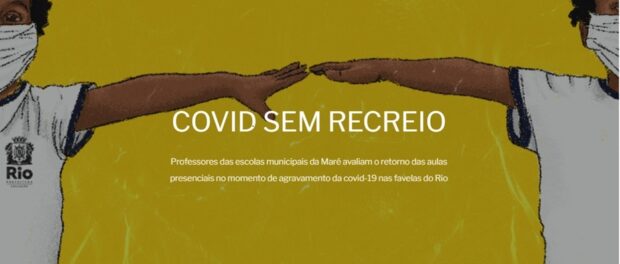
This is our latest article on Covid-19 and its impacts on the favelas. For the original article in Portuguese, written by Edilana Nascimento and published by Data_Labe click here.
Children having their literacy delayed; parents who need to work and have no one to leave their kids with; and teachers unable to adapt to online teaching—factors such as these led authorities to resume in-person classes in municipal public schools in Rio de Janeiro at the end of February, as long as units met a list of requirements such as reducing the number of pupils per class and setting up hand sanitizer dispensers. The consequences of Covid-19, however, are not solely restricted to adaptations made to physical facilities.
In speaking about the pandemic, we need to understand that its effects hit specific places harder, and favelas feature among these. According to data from the Covid-19 in Favelas Unified Dashboard, there are more than 38,000 cases of the disease, and over 3,900 confirmed deaths in favelas.* Complexo da Maré leads the figures with approximately 3,300 cases and over 170 deaths.
Aline (name has been changed) knows these figures up close. She lost her wife to Covid-19. Aline says that her partner, a teacher like her, was not part of the risk group. Today she struggles trying to rebuild her life. “I will never get over the fact that I lost the greatest love of my existence.”
Aline was also hospitalized due to the infection and, still mentally shaken, fears recontamination when she starts teaching in-person classes again. “I’m not going back of my own free will; I’m going back because society hasn’t learned anything from this virus.”
Before classes were suspended, from March 26 to April 4, municipal public schools had resumed in-person classes incrementally. In Maré, school units started to reopen on February 24. According to Rio’s Municipal Secretariat for Education, by the first half of March, 271 of the city’s schools were open for on-site attendance, with four of them located in Maré.
“Teachers are scared, as some of them live with their parents, their children and other relatives, who are also scared. At the same time, I get the feeling that most teachers are not dealing well, psychologically, with these online classes.” — Juliana Cantinin, teacher
Structures are Inadequate for Resuming In-Person Classes
The lack of appropriate physical structures in Maré made it even harder to adapt conditions to City Hall’s safety protocols. That is the case of the Helio Smidt Municipal School, where 28-year-old Juliana Cantinin works. The music teacher says that the school does not have the necessary sanitary conditions for in-person classes to resume. “We are struggling on our own; I’m not getting any guidance from the top,” she says.
Born and raised in Complexo do Alemão, Juliana adds that the absence of public policies that should have been implemented at the beginning of the pandemic affects teachers, students and their parents. According to the teacher, there are many angles to the problem. “Teachers are scared, as some live with their parents, their children and other relatives, who are also scared. At the same time, I get the feeling that most teachers are not dealing well, psychologically, with these online classes.” Furthermore, the students’ families are suffering. “Parents are desperate. They were being forced to work in-person and it was the school that was watching over their children.”
The fears felt by education professionals and families are not unfounded: between February 24 and March 9, 56 cases of Covid-19 were confirmed in the 120 schools that had resumed in-person classes. According to the Alerta Covid RJ app, which brings together all notifications of contamination within school communities, 33 of the cases recorded are education professionals and the other 23 are students. Since Maré’s favelas are even more vulnerable territories, with the State failing to offer social services at the beginning of the pandemic, the reopening of schools makes the situation even more serious.
The Municipal Secretariat for Education informed us by email that “resuming classes is optional for students and it is up to the student’s legal guardian to choose when they should return to in-person classes, so long as the student is 18 or under. And teachers with comorbidities will not be working at school but, rather, remotely.”
*The Covid-19 in Favelas Unified Dashboard and RioOnWatch are both programs of NGO Catalytic Communities. The data presented in the English translation above have been updated from the original article published in Data_Labe.

